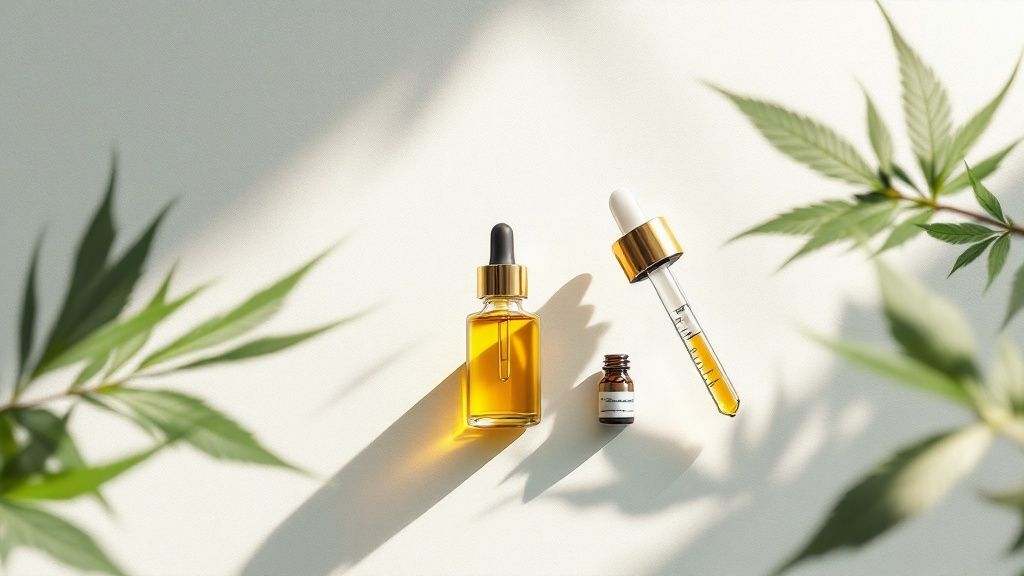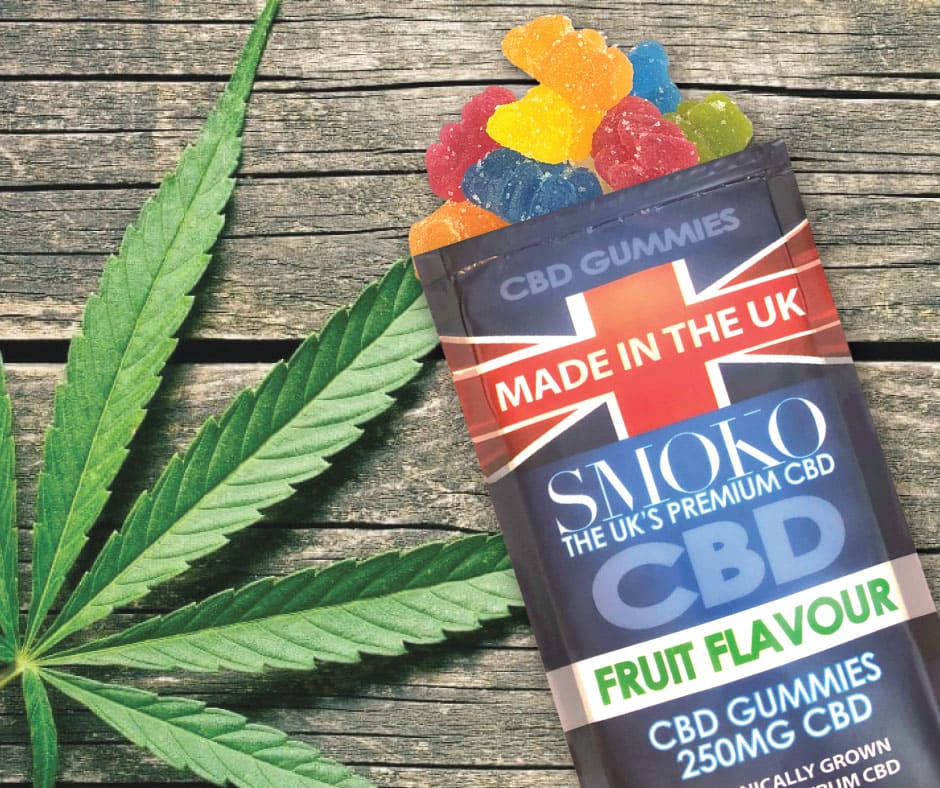The Science Behind CBD for Inflammation
Inflammation is your body's natural defence mechanism against injury or infection. It's a complex process designed to protect and heal. However, when inflammation persists, becoming chronic, it can lead to a range of health problems. This is where CBD, or cannabidiol, may offer a potential solution. CBD interacts with the body's endocannabinoid system (ECS), a complex network of receptors and neurotransmitters that helps regulate various bodily functions, including inflammation. The ECS acts like an internal control centre, constantly working to maintain homeostasis, or balance. CBD interacts with this system, influencing how it manages inflammatory responses.

How CBD Interacts With the ECS
Unlike THC, CBD doesn't directly bind to the primary ECS receptors. Instead, it interacts indirectly, modulating their activity and influencing other pathways related to inflammation. For instance, CBD can inhibit the enzyme that breaks down anandamide, a naturally occurring endocannabinoid with anti-inflammatory and pain-relieving properties. This allows anandamide to remain active in the system longer, potentially boosting its beneficial effects. CBD also interacts with receptors outside the ECS, like TRPV1 receptors, which are involved in inflammation and pain perception. By influencing these receptors, CBD may help manage discomfort linked to inflammatory conditions.
CBD and Inflammatory Pathways
Research indicates that CBD may help reduce the inflammatory response by modulating various pathways within the body. One study highlighted CBD's potential to reduce levels of pro-inflammatory cytokines, signalling molecules that promote inflammation. The research also suggests that CBD can inhibit T cell proliferation, a key part of the inflammatory response. This is especially relevant for conditions involving an overactive immune system, where excessive T cell activity contributes to chronic inflammation. Moreover, CBD may induce T cell apoptosis (programmed cell death), potentially helping to regulate an extreme immune response and reduce inflammation. This mechanism is important for preventing long-term damage from chronic inflammatory conditions.
CBD and Lung Inflammation
One example of CBD’s potential benefits is its ability to address lung inflammation, especially in situations like severe COVID-19. Studies suggest CBD may help regulate the cytokine storm associated with acute respiratory distress syndrome (ARDS), a serious complication of COVID-19. Read the full research here. By modulating the inflammatory response in the lungs, CBD could help protect against severe lung damage. However, more research is needed to confirm these findings. CBD's anti-inflammatory properties have been studied in the UK.
Starting Your CBD Journey
If you’re considering CBD for inflammation, SMOKO CBD products offer options like soft gels, gummies, and oral drops. A good starting point is the "start low, go slow" method. Topical CBD creams and ointments, while not part of the SMOKO CBD product line, can be useful for targeting specific areas of inflammation. SMOKO CBD products are taken orally, potentially offering systemic benefits from within. Understanding the spectrum type is important when selecting a CBD product. CBD isolate contains only CBD, while broad-spectrum CBD includes other cannabinoids and terpenes but no THC. Full-spectrum CBD contains all the compounds found in the cannabis plant, including trace amounts of THC. If you are subject to drug testing, avoid full-spectrum products.
How CBD Transforms Inflammatory Response Pathways
Inflammation is a vital bodily process, crucial for healing and protection. Think of it as the body's defences, like an army - there to fight off the bad guys to protect the land and get rid of unwanted visitors. The body sends lots of soldiers, a fight happens and land gets trampled and boggy; the area of inflammation does get damaged by the inflammatory process, so chronic inflammation can lead to the body hurting itself. But this is where CBD may offer potential benefits. CBD interacts with the body's complex systems, notably the endocannabinoid system (ECS), to potentially regulate inflammation at a molecular level.
CBD's Impact on the Body's Inflammatory Cascade
CBD interacts with the body’s internal systems in a complex way, influencing inflammatory responses. Unlike THC, CBD doesn't directly bind to the main ECS receptors. Instead, as research from the National Institutes of Health (read the full study here) indicates, it modulates their activity indirectly, impacting other pathways crucial for inflammation regulation. This modulation can be particularly important for conditions like arthritis, where chronic inflammation plays a major role.
For instance, CBD can inhibit the enzyme that breaks down anandamide, an endocannabinoid known for its anti-inflammatory properties and its impact on pain perception. By prolonging anandamide's presence, CBD may contribute to pain relief and reduced inflammation. CBD also interacts with receptors outside the ECS, such as the TRPV1 receptors, which are involved in pain and inflammation. CBD may also influence the production of cytokines and this interplay could influence how the body perceives and manages discomfort linked to inflammatory conditions, as well as reduce the inflammation itself.
Attenuating the Inflammatory Response With CBD
There is a fair amount of research suggesting CBD could help attenuate the inflammatory response. A study (detailed research here) indicates CBD may reduce levels of pro-inflammatory cytokines, reduces the distribution of these T-cells, and encourages them to die. These cytokines act as messengers, amplifying inflammatory signals in the body. By potentially reducing their levels and how they proliferate, CBD might help reduce the overall inflammatory response.
This potential modulation of inflammation becomes especially important in situations like acute respiratory distress. A study published in Science Advances showed promising results concerning CBD's potential to regulate the cytokine storm associated with severe respiratory conditions, such as those seen during the COVID-19 pandemic. However, further research is necessary to fully understand the mechanisms and long-term effects.
To further clarify CBD's effects on inflammation, let's examine some key inflammatory markers:
The following table presents the impact of CBD on various inflammatory compounds in the body, based on scientific research.
|
Inflammatory Marker |
Normal Function |
Effect of CBD |
Potential Benefit |
|---|---|---|---|
|
Cytokines (e.g., TNF-α, IL-1β, IL-6) |
Signalling molecules that promote inflammation |
May reduce levels |
Decreased inflammation, pain relief |
|
Anandamide |
Endocannabinoid with anti-inflammatory and pain-relieving properties |
Inhibits enzyme breakdown, increasing its presence |
Enhanced pain relief, reduced inflammation |
This table summarises some of the key ways CBD may interact with the body's inflammatory processes. As research continues, we can expect a more comprehensive understanding of these interactions and their therapeutic potential.

Incorporating CBD for Inflammation Management
If you're exploring CBD for inflammation management, a "start low, go slow" approach is recommended. Beginners might consider starting with 5-10mg of CBD daily, preferably taken orally. The dosage can be gradually increased as needed. SMOKO CBD offers a variety of orally administered products like CBD soft gel capsules, CBD gummies, and CBD oral drops suitable for those new to CBD.
While topical CBD creams and ointments can target localised inflammation, SMOKO CBD specialises in oral products to impact the endocannabinoid system from within.
It's always advisable to consult with a healthcare professional before starting any new supplement, especially if you have pre-existing conditions or are taking other medications as CBD can impact how these other medications are absorbed. Healthcare professionals can provide guidance on whether CBD is right for you and advise on appropriate dosing.
Respiratory Protection: CBD's Role in Lung Inflammation
The COVID-19 pandemic highlighted the devastating impact of acute respiratory inflammation. This increased interest in potential therapies, including CBD, for managing such conditions. Ongoing research suggests CBD may play a role in modulating the inflammatory response in the lungs.

CBD and The Inflammatory Process in The Lungs
Lung inflammation, a natural defence, can become dangerous when overactive, as seen in conditions like acute respiratory distress syndrome (ARDS). This overactivation can cause a cytokine storm, where the immune system releases excessive inflammatory molecules, resulting in severe damage and more fluid in the lungs which, in turn, leads to an increased risk of pneumonia.
Research, including a study in Science Advances (access the study here), indicates CBD may help regulate this cytokine storm. By interacting with the body's endocannabinoid system (ECS), CBD may reduce the release of inflammatory cytokines, potentially lessening lung damage. Further studies, such as one by the National Institutes of Health (read more), show CBD's potential to reduce pro-inflammatory cytokines, inhibit T cell proliferation, and induce T cell apoptosis, supporting its role in managing inflammation.
CBD’s Potential in Respiratory Conditions
Beyond cytokine storms, CBD may offer other respiratory benefits. Research suggests it can reduce airway inflammation, potentially helping conditions like asthma and chronic obstructive pulmonary disease (COPD). Another study highlights CBD's potential to lessen the inflammatory response, suggesting its use in managing various respiratory inflammatory conditions.
SMOKOCBD Oral Solutions: Targeting Inflammation
Inflammation is a natural bodily response to injury or infection. However, when it becomes chronic, it can lead to various health problems - this is one of the factors impacting conditions like arthritis, where inflammation causes more damage to the joints and nerve-endings, leading to increased pain. CBD may offer a potential solution for managing inflammation like this. SMOKOCBD's oral products, including soft gel capsules, gummies, and oral drops, utilise CBD's properties to potentially provide relief.

Choosing Your SMOKOCBD Delivery Method
Each SMOKOCBD delivery method offers unique characteristics:
-
Soft Gels: Precise dosing of 25mg of CBD, tasteless, and convenient for on-the-go use. They offer prolonged relief due to slower absorption.
-
Gummies: Enjoyable taste and easy dosing of 25mg CBD per gummy. Absorption can be slower than soft gels due to the digestion process.
-
Oral Drops: Offer the fastest absorption as they bypass the digestive system, allowing for quicker effects and precise dosing control. Available in 3 strengths: 500mg, 1000mg and 2000mg bottles.
Dosing for Inflammation Relief
When starting with SMOKOCBD, a "start low, go slow" approach is essential. Begin with a low dose, such as 5-10mg per day. Gradually increase the dose until you find what works best for you. This personalised approach allows you to monitor your response and minimise potential side effects.
The UK CBD market is growing rapidly, with projected sales exceeding £1 billion in 2025. This growing interest in CBD reflects its potential benefits for various health concerns, including inflammation. Find more detailed statistics here. However, navigating this expanding market requires careful consideration of product quality and consistency.
Topical Applications and SMOKOCBD
SMOKOCBD focuses on oral products for systemic benefits. However, topical CBD creams and ointments can target specific areas of inflammation. These products interact with cannabinoid receptors in the skin, potentially offering localised relief. While not offered by SMOKOCBD, topical applications can complement an oral regimen for a more comprehensive approach to inflammation management. Consult with a healthcare professional before starting any new supplement, especially if you have underlying health conditions or take other medications. They can provide personalised guidance on incorporating CBD into your wellness routine.
Cannabis Compounds and Medical Value - An Experts Discussion
Understanding Topical CBD and Localised Inflammation
Topical CBD products, like creams and ointments, interact with cannabinoid receptors in the skin. These receptors are part of the endocannabinoid system (ECS), which regulates various bodily functions, including inflammation. Applying CBD directly to the affected area allows for focused action, potentially reducing inflammation and pain without CBD entering the bloodstream. This localised approach can be particularly helpful for joint discomfort, muscle soreness, and inflammatory skin conditions like acne.
Incorporating CBD Into Your Routine
To help you understand the differences between oral and topical CBD for inflammation, we've created the following comparison table:
Oral vs. Topical CBD for Inflammation
This comparison table will help readers understand when to choose each delivery method based on their specific inflammation needs
|
Factor |
Oral CBD Products |
Topical CBD Products |
|
|---|---|---|---|
|
Area of Effect |
Systemic (whole body) |
Localised (specific area) |
|
|
Onset of Effects |
Slower (30-90 minutes) |
Faster (within minutes) |
|
|
Duration of Effects |
Longer lasting |
Shorter lasting |
|
|
Application |
Ingested (softgels, gummies, drops) |
Applied to skin (creams, ointments) |
|
|
Best For |
Overall wellness, widespread inflammation |
Targeted relief, muscle soreness, joint pain, skin conditions |
|
This table highlights the key differences between oral and topical CBD.
Topical creams and ointments provide localised relief when applied directly to the affected area, but the amount and frequency depend on the product’s concentration and your individual needs. Combining topical and oral CBD can be a good strategy for targeting specific inflammation while supporting overall wellness. Be sure to follow product instructions and consult with a healthcare professional for personalised guidance.
CBD Spectrum Choices: Finding Your Anti-Inflammatory Match
The type of CBD spectrum you choose could significantly impact its effectiveness in addressing inflammation. This section explores the key differences between CBD isolate, broad-spectrum CBD, and full-spectrum CBD, focusing on their anti-inflammatory properties.
Understanding the Entourage Effect
Full-spectrum and broad-spectrum CBD products contain other cannabinoids and terpenes in addition to CBD. This combination creates the entourage effect, where these compounds work together, potentially boosting the overall therapeutic benefits, including anti-inflammatory action. Think of it as an orchestra: each instrument contributes its unique sound, but together they create a richer, more harmonious melody.
Choosing the Right Spectrum for Your Needs
-
CBD Isolate: This contains only pure CBD. It's a good option if you want to avoid other cannabinoids and terpenes.
-
Broad-Spectrum CBD: This contains CBD alongside other beneficial cannabis compounds, but importantly, no THC. All SMOKOCBD products, including our soft gel capsules, gummies, and oral drops, are broad-spectrum. This provides the potential benefits of the entourage effect without the risks associated with THC.
-
Full-Spectrum CBD: This contains all compounds found in the cannabis plant, including trace amounts of THC. While it may offer the most pronounced entourage effect, it's unsuitable for those subject to drug testing due to the presence of THC. Even small amounts can trigger a positive test.
Topical CBD vs. Oral CBD from SMOKOCBD
SMOKOCBD focuses on oral CBD products. Our soft gel capsules, gummies, and oral drops are designed for oral consumption, allowing for potential systemic benefits throughout the body. While SMOKOCBD focuses on oral products, topical CBD creams and ointments can offer targeted relief for localised inflammation. These products interact with skin cannabinoid receptors, potentially easing pain and discomfort in specific areas. Topical CBD can complement oral CBD for a more comprehensive approach to inflammation management.
UK Regulations and THC Content
In the UK, CBD products must contain less than 0.2% THC or 1mg per container. This is crucial when selecting a product, especially if you undergo drug testing. SMOKOCBD products are rigorously tested to ensure they meet UK regulations and contain zero THC. This allows you to experience the potential benefits of CBD without worrying about a positive drug test.
Effective CBD Dosing: Your Inflammation Relief Roadmap
Finding the right CBD dosage for inflammation relief can be challenging. This guide offers practical advice, grounded in research, to help you personalise your approach safely and effectively. The core principle is to start low and go slow, a common recommendation from healthcare professionals. This minimises potential side effects while helping you discover your optimal dosage.
Beginner Dosing Regimen for Inflammation
If you're new to CBD, starting with a low dose of 5-10mg per day is generally recommended. Individual responses vary due to factors like metabolism and bodyweight, so this starting dose provides a safe entry point.
-
Week 1: Begin with 5mg of SMOKOCBD oral drops once daily.
-
Week 2: If you haven't observed significant changes, increase to 10mg daily.
-
Week 3 & Beyond: Gradually increase by 5mg increments weekly until you find the dose that best relieves your inflammation. Journaling your progress and noting any changes is helpful for keeping track of improvements and dosing.
This is a general guideline. Consulting a healthcare professional is always recommended before starting any new supplement, particularly if you have pre-existing conditions or are taking other medications.
Dosing With Your SMOKOCBD Product
SMOKOCBD provides a range of oral products containing broad-spectrum CBD suited to this dosing regimen:
-
SMOKOCBD Soft Gel Capsules: Minimal dose is 25mg CBD as each capsule contains 25mg of CBD.
-
SMOKOCBD Gummies: Minimal dose of about 12.5mg CBD - each gummy contains 25mg CBD so could be split in half.
-
SMOKOCBD Oral Drops: Minimal dose of about 1.9mg CBD (1 drop from a 500mg bottle). Best for maximum control over dosing. Stronger bottles available to increase the amount of CBD per drop
New users may well prefer to aim for half a gummy per day, or 4-6 drops total daily of the 500mg strength oral drops. As you increase the dosage (as necessary), taking one 25mg SMOKO CBD soft-gel capsule or one SMOKO CBD gummy per day may do the trick.
Ready to explore the potential benefits of CBD for inflammation? Explore SMOKOCBD's range of high-quality, broad-spectrum products today! Visit SMOKOCBD









